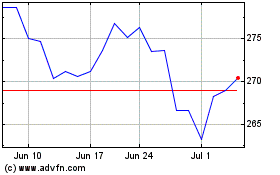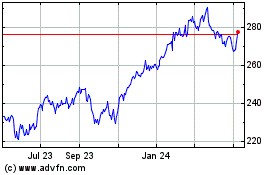Fed to Sell Corporate Bonds and ETFs Purchased During Covid-19 Crisis -- 2nd Update
June 02 2021 - 7:10PM
Dow Jones News
By Paul Kiernan
The Federal Reserve will soon begin selling off the corporate
bonds and exchange-traded funds it amassed last year through an
emergency-lending vehicle set up to contain the Covid-19 pandemic's
economic fallout.
The vehicle, known as the Secondary Market Corporate Credit
Facility, or SMCCF, held $5.21 billion of bonds from companies
including Whirlpool Corp., Walmart Inc. and Visa Inc. as of April
30. In addition, it held $8.56 billion of exchange-traded funds
that hold corporate debt, such as the Vanguard Short-Term Corporate
Bond ETF.
The sales, which should be completed by the end of this year,
are unrelated to monetary policy, a Fed official said. Net proceeds
will be remitted to the Treasury Department, which funded the
facility's creation.
The SMCCF's corporate-debt holdings are distinct from the more
than $7.3 trillion of Treasury debt and agency mortgage-backed
securities on the Fed's balance sheet. The central bank under
Chairman Jerome Powell is continuing to purchase those types of
assets to the tune of at least $120 billion a month to hold down
long-term borrowing costs until the economy recovers further from
the pandemic.
The SMCCF was set up in March 2020 as part of a broader suite of
programs established by the Fed and Treasury to shore up liquidity
in financial markets. Stock and bond markets at the time were
reeling from the fear and uncertainty regarding the coronavirus and
economic lockdowns to contain it.
The Fed's announcement of the facility and a related vehicle,
the Primary Market Corporate Credit Facility, quickly restored
investor confidence in major corporations' ability to issue debt.
As a result, the latter vehicle never made a purchase, and the
SMCCF's holdings peaked at around $14.2 billion last year, a far
cry from the two programs' combined $750 billion of firepower.
"The SMCCF proved vital in restoring market functioning last
year, supporting the availability of credit for large employers,
and bolstering employment through the Covid-19 pandemic," the Fed
said in a statement Wednesday.
The corporate-credit programs stopped buying assets on Dec. 31
after then-Treasury Secretary Steven Mnuchin declined to extend
several of the Fed's emergency lending programs.
In testimony before the House Financial Services Committee last
June, Mr. Powell suggested the central bank would likely hold the
individual corporate bonds until they matured, rather than selling
them back into the market. "We are generally a hold-to-maturity
entity," Mr. Powell said in response to a lawmaker's question about
the Fed's plans for the SMCCF. "It may be that we sell some back
into the secondary market down the road, but ultimately, we're a
buy-and-hold buyer," Mr. Powell added.
In Wednesday's statement, the Fed said it plans to sell the
bonds and ETF holdings in a gradual and orderly way that seeks to
minimize "the potential for any adverse impact on market
functioning."
The New York Fed, which manages the SMCCF, will provide
additional details soon and before sales begin, the statement
added.
Write to Paul Kiernan at paul.kiernan@wsj.com
(END) Dow Jones Newswires
June 02, 2021 18:59 ET (22:59 GMT)
Copyright (c) 2021 Dow Jones & Company, Inc.
Visa (NYSE:V)
Historical Stock Chart
From Mar 2024 to Apr 2024

Visa (NYSE:V)
Historical Stock Chart
From Apr 2023 to Apr 2024
